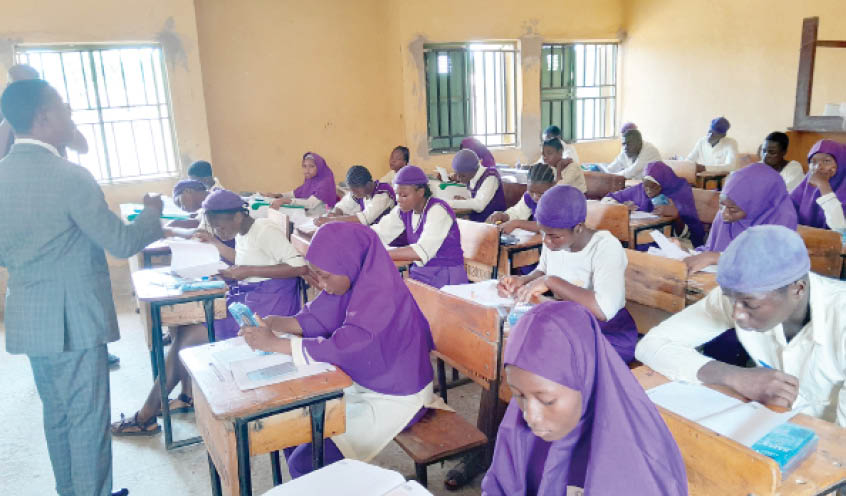“To me, examination comes with so much anxiety in such a way that no matter how much I read and prepare for it, I will always feel like I am not well-prepared. I will always say, it’s like I did not start reading on time or I am yet to cover more,” said Mary, an undergraduate.
Mary said this was not the case when she was in secondary school, because then examination was not such a big deal as classmates and teachers came to her aid when she got to a point where she needed help.
She said that on getting to the university, things changed because there were stringent instructions like you cannot speak to anyone exchange materials, and that in most cases she couldn’t sit with her friends.
With average grades in the university, Mary said she was an A student in secondary, but that she was demystified when she got into the university.
Atiku, expert fault FG’s plan to use pension fund for infrastructure
Why FG delays reconstituting varsities’ governing councils – NUC
While noting that she was working on herself and getting used to the university system, Mary said if she had learnt to be and wrote all her examinations in secondary school without any assistance, she believed she would have been doing far better than she was doing in the university.
Mary is not the only one in this; as many students have graduated from secondary school carrying results that portray them as A students but only to get to the university and start struggling to fit in.
Another undergraduate, who wants to be addressed as David, said he realised that helping students out during examinations was really a disservice contrary to the belief that they were helping them to get good grades.
Davis said, “I left my school to register for WAEC in another school because the teachers there helped students during examinations; they wrote on the board and the students copied and passed with good grades. On getting to the university, I realised that things are different.”
He said he suffered a while but that because he was never a dull student he was able to face the reality and work on himself to get to a good level of grading, stating, “I may not graduate with first class, but I know 2.1 will not pass me by.”
He, therefore, urged teachers to stop helping students to write examinations.
He further said, “I know a student with seven As and a B in his WAEC, but he does not understand anything going on in class. He has been struggling with carry overs and is yet to find his feet. Though he is using money to buy his way, you know in the university it is not as easy as secondary school, because the lecturers are not all on the same page when it comes to that.”
Meanwhile, in recent times, a write-up tagged: “The Plea of University Lecturers to Teachers in Secondary Schools”, trended online. The author pleaded with secondary school teachers and school owners to help the students and the public by ensuring that students in their schools write examinations by themselves and merit the grades they brandish later.
The write-up reads in part: “We are tired of seeing students with A1 in mathematics but they cannot resolve the smallest of fractions. A student with distinctions in physics and chemistry but knows next to nothing about chemical reactions or energy conversion. Students with distinction in literature, government and CRS, yet blank on the differences between drama and prose and fiction, forms of government and the significance of religious stories.”
It further reads: “I had to ask some year one students to look for a tutorial teacher to help them with JSS3 and SS1 mathematics recently. The whole 16 of them in my engineering class with excellent SSCE results were visibly confused at the sight of any arithmetic work. Their last semester performance betrayed the several A1s and B3s on the WAEC result sheets they carry about.
“These students you help acquire grades they can’t defend are usually frustrated in the ivory tower. Save them a voyage of pain and regret in the future by ensuring they are well-tutored and allowed to prepare and write their examination unaided.”
Barrister Hanatu Enwemadu, the Executive Director of A Mother’s Love Initiative, said the plea in the write-up highlighted a crucial issue in Nigeria’s education system.
She said, “Educators and school administrators at all levels need to recognise the importance of real learning over simply chasing high grades. Too often, the focus on grades leads to schools being seen as high achievers, but true education is about more than that. Students deserve the chance to truly understand concepts and develop skills that go beyond exams.”
She told Daily Trust that addressing the challenge required action from everyone, including government intervention and collaboration of all stakeholders.
She said, “We need to prioritise preparing students for life, not just for tests. Giving children the time and support to grow physically, mentally and socially is key to nurturing their reasoning and problem-solving abilities for the future. We must stop hurrying children and allow them to grow.”
She disclosed that her organisation was deeply committed to addressing crucial issues such as ensuring that children were enrolled in school at age-appropriate times, which directly impacted their ability to navigate life’s challenges and educational experiences.
A teacher, Sophia Emmanuel, said teachers should not be blamed alone, but rather the school owners, parents and government as well.
She said, “Sometimes teachers who teach certain subjects are forced to help students because mass failure will portray that they have failed in their duty. So, in order to be seen as good teachers, they go out of their way to assist students during exams.”
She noted that some parents intentionally tipped teachers with cash and gifts to buy them over so as to help their children, while some proprietors bribed supervisors to look the other way so that teachers could assist students.
She further said, “Provided it is the grade that is being prioritised, the issue will continue because the end result is for such students to graduate with results that will take them to the next level, and if care is not taken they will also use same methods to graduate from the university and cannot defend their certificates.”
A parent, Eucharia Azubuike, said helping a student should only imply that the teacher taught the child to understand the subject by using the simplest formats, but that assisting the student write examination was no longer helping but causing damage to the child’s future.
She said, “The guilty teacher is not only teaching the child to parade a fake result, but how to cut corners in their endeavours, and this will push such a child to not just lose confidence when no assistance is coming during exams, but to see education as difficult and a burden.”
The Chairman and Proprietor of Micray Progressive School, Lokoja, Kogi State, Michael Sule Ojonugwa, said he did not encourage his staff to help in writing exams for students.
He said, “Doing so will defeat the aim of establishing the school, which is progressive learning. So, proprietors and teachers who do that should stop because they are not only destroying the education of the children but also putting them where they do not belong.”
Ojonugwa, however, blamed the system that placed more regard to certificates and not skills and ability, saying that was what pushed students, teachers and parents into such acts as no one wanted to be left behind.

 Join Daily Trust WhatsApp Community For Quick Access To News and Happenings Around You.
Join Daily Trust WhatsApp Community For Quick Access To News and Happenings Around You.
